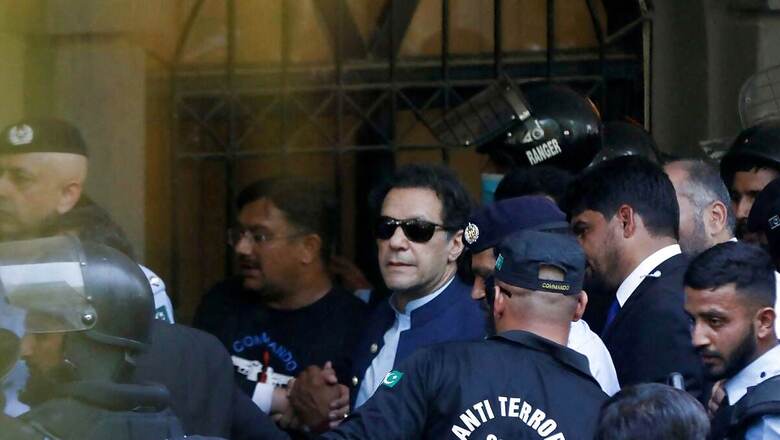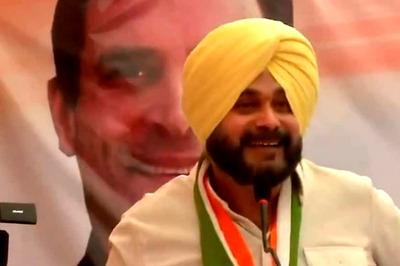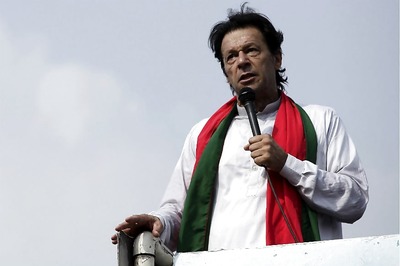
views
It is an old adage: if you come for the king, you best not miss. Apart from suicide, a coup d’état is a crime in which people get punished if they fail. Pakistan’s former Prime Minister Imran Khan’s unforgivable crime is that he targeted the real rulers of the country – the Pakistan Army and their chief – and missed. Now the military establishment and the incumbent regime are going after him with a vengeance. The odds are stacked heavily against him. The Pakistan Army is in an unforgiving mood, which has become clear in a series of press releases issued by the spokesman of the military. But the latest statement issued after the meeting of the Formation Commanders – the entire top brass of the Pakistan Army – is the most ominous for Imran Khan.
The Army brass is in a really ugly mood and has made it clear that it will not only hold military trials of the ‘perpetrators’ of the attacks on military installations on May 9, but also the ‘planners and masterminds’ behind the “rebellion against the state and state institutions.” Simply put, the Army has Imran Khan in its crosshairs and is accusing him of waging war against the state of Pakistan – a crime punishable by death. What’s more is that the Army has issued a warning to the cabal of judges led by Chief Justice of Pakistan, Umar Ata Bandial, that it will not allow anyone to obstruct or stymie whatever it has in store for those who had the temerity to challenge the Pakistan Army and target its bases.
In the last month since Imran’s failed putsch, the Pakistan Army and government have pulled out all stops to dismantle Imran’s political vehicle, Pakistan Tehrik-e-Insaf (PTI). Using brute force, blackmail, and intimidation (including arrests of family members, raiding of residences, misbehaviour with women folk and even detaining them), the PTI is being stripped of all political leaders of any consequence. A virtual deluge of desertions has hit the PTI, denuding it of a bulk of its second and third-rung leaders. Such tactics have been deployed in the past against the Pakistan Peoples Party (PPP) after the 1977 coup, Pakistan Muslim League Nawaz (PMLN) after the 1999 coup, and Altaf Hussein’s Muttahida Quami Movement (MQM) in 2016 after a controversial speech.
But even by Pakistani standards, the speed at which the PTI has been disintegrating in Punjab and to an extent in Sindh is quite breathtaking. Some of the most vocal and visible, if also vitriolic and vacuous, ‘leaders’ like Fawad Chaudhry, Ali Zaidi, Fayyaz Chohan, Aamir Kayani, Murad Rass and Imran Ismail have dumped Imran and PTI after a bit of arm twisting by the ISI and local police. Many of the Punjab leaders – most of them very boastful and full of bluster – couldn’t bear even a couple of days in jail, and jumped ship. Some of them like former ministers Shireen Mazari and Maleeka Bokhari have renounced politics. Few holdouts in Punjab are under enormous pressure to quit or face the consequences. The only place where the PTI leaders haven’t quit en masse, so far, is Khyber Pakhtunkhwa. But even there, it is a matter of time before the military establishment engineers a breakaway faction that takes away a bulk of the electable leaders.
In Punjab, a new party – Istehkam-e-Pakistan Party (IPP) – under Imran’s estranged former right-hand man, financier and political trouble-shooter Jehangir Tareen has been set up. Just as politicos were corralled into PTI by the military in the years leading up to 2018 and after the elections in that year, the deserters of PTI have been ‘instructed’ or ‘encouraged’ to join Tareen’s IPP. According to some accounts, efforts by some of the deserters to form their own small groups have been nipped in the bud and they have been told to go with Tareen or else… As far as the party workers are concerned, they have had to face really nasty treatment reserved for the Hoi Polloi in the ‘Land of the Pure’. They have been left defenceless by the party which, in any case, has disintegrated.
The crackdown has so far only targeted Imran Khan politically, not personally. But that is only a matter of time. He has managed to avoid being arrested, in part, because the focus is on draining out his street support, and in part because of the cover given to him by a coterie of judges who are his loyalists. These judges have uncharacteristically gone against the military. But something has got to give in the next few days or weeks. The kind of blatant bias being displayed by the judges cannot be sustained for very long. But as long as the Army stays within the four corners of the law, its hands will be tied behind its back in trying to move against either Imran or the judiciary. Neither warnings nor threats seem to be working either on the judges or even on Imran who remains defiant. It isn’t clear if the defiance is because he is unhinged or because he is confident, or even because he has decided that if he has to go, he will, in a blaze of glory with the halo of a martyr. There are reports that the Army has tried to even offer Imran an exit route – distance himself from politics, hand over the reins of the party to someone else, go into exile – but he has refused to take it. Perhaps once the judiciary is tamed, Imran will read the writing on the wall. But it is a big if.
In the good old days, the military would not have hesitated in making short work of Imran. But times have changed and any drastic or precipitate action could easily backfire badly on the military. This is why the Pakistan Army is trying to stay within the constitutional framework while fixing Imran Khan. Even so, there is no way the Army will allow Imran to stay in active politics. Even the possibility of letting do any kind of back-seat driving is practically non-existent. Although the Army is reducing PTI into a shell, as long as Imran is around, even the shell is dangerous. The thing is that while the Army might have built up Imran, his support base is now much bigger than what the Army passed on to him in the form of electable leaders. This vote base is not going to be transferrable to anyone without him. The new party, IPP, will impact Imran organisationally but whether it will do that politically remains to be seen. Imran’s support base has three components: diehard loyalists, the electables vote and the floating vote. His loyalists aren’t deserting him in any significant numbers yet; the electables are no longer with him; the floating vote will split but Imran is expected to get a substantial chunk of it. How this plays out at the hustings between Imran and the other parties is a toss-up. But because it is all so iffy, the military will not want to take a chance of Imran either sneaking back into power or even holding the balance of power.
The Army is also not comfortable with the two older established parties – PMLN and PPP. They have therefore forged the IPP in the hope that it will be able to emerge as a third force and hold the balance of power more accurately, allowing the military to hold the balance of power. This means that the military establishment is trying to ensure that as and when elections are held, no party emerges with a majority. In other words, a split mandate is what the Army wants. The fragmentation of politics might be in the best interest of the military but doesn’t augur well for the country. The weak governments that will result from this political engineering will hardly be in a position to take the terribly tough decisions that are required if an economic meltdown is to be prevented.
Compounding the problems for the Army is the fact that the PMLN supremo Nawaz Sharif appears to have become wise to the Army’s political games. The PMLN feels that if the Army is preparing the field to cut it to size, then it must lay enough minefields that the Army gets caught in the web it is spinning. The budget for the year 2023-24 seems to be designed towards that end. It throws fiscal responsibility to the winds. It is a populist budget, albeit on an empty treasury and a sinking economy. The can will have to be carried by the caretakers who will take the reins of government from the PMLN and lead the country into elections. The caretakers will have to reverse the populist measures in the PMLN budget if they want to enter into a new IMF programme, which will have its own political repercussions.
Throwing the book at Imran and neutering him politically is unlikely to bring the stability that Pakistan desperately needs. If anything, Pakistan could be facing even greater instability in the weeks and months ahead, with the economy melting down, the politics unmanageable and terrorism becoming uncontrollable. Neither an election, nor a selection, and not even a coup d’état will be able to solve the predicament that Pakistan is facing because the entire state structure is working at cross-purposes.
The writer is Senior Fellow, Observer Research Foundation. Views expressed are personal.




















Comments
0 comment